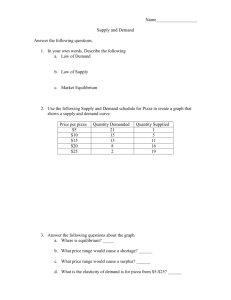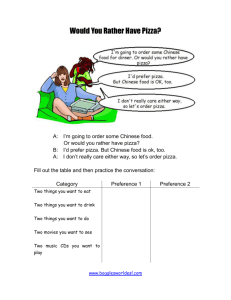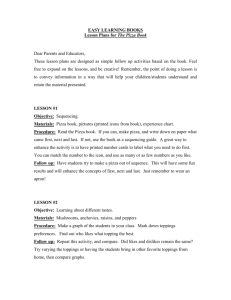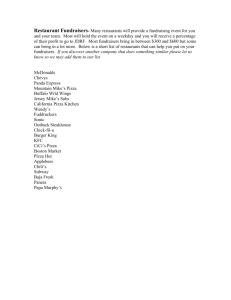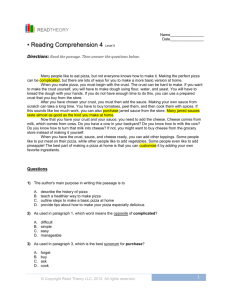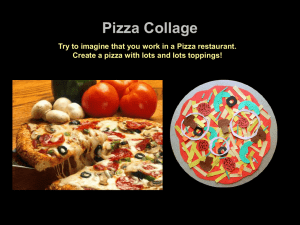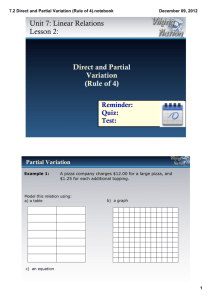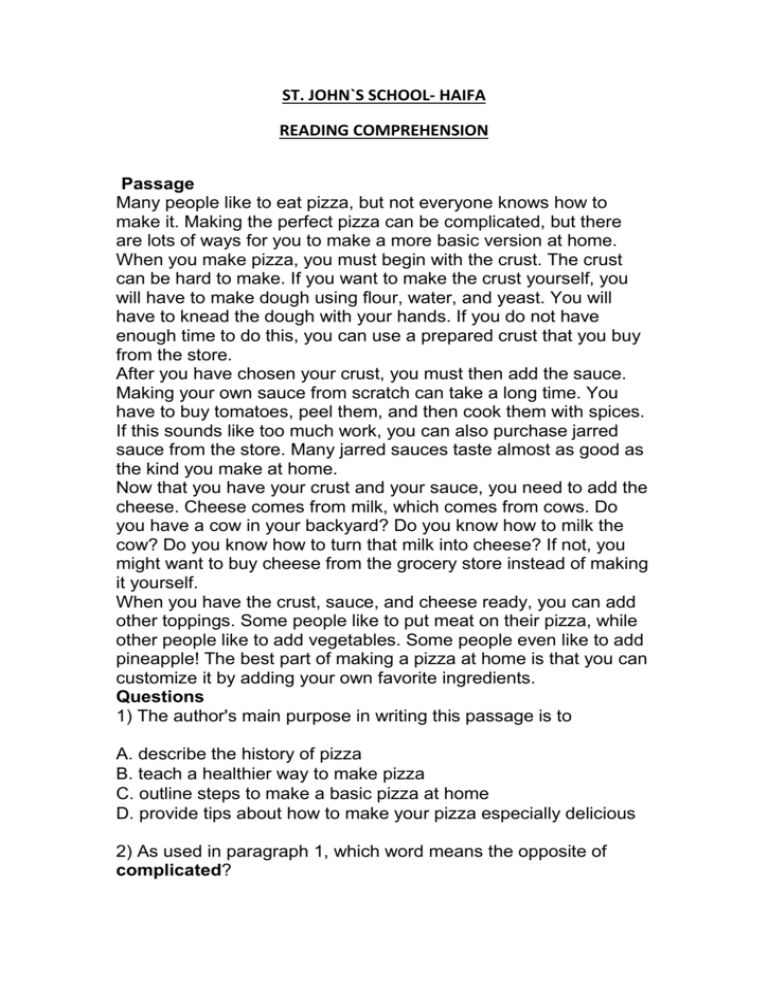
ST. JOHN`S SCHOOL- HAIFA
READING COMPREHENSION
Passage
Many people like to eat pizza, but not everyone knows how to
make it. Making the perfect pizza can be complicated, but there
are lots of ways for you to make a more basic version at home.
When you make pizza, you must begin with the crust. The crust
can be hard to make. If you want to make the crust yourself, you
will have to make dough using flour, water, and yeast. You will
have to knead the dough with your hands. If you do not have
enough time to do this, you can use a prepared crust that you buy
from the store.
After you have chosen your crust, you must then add the sauce.
Making your own sauce from scratch can take a long time. You
have to buy tomatoes, peel them, and then cook them with spices.
If this sounds like too much work, you can also purchase jarred
sauce from the store. Many jarred sauces taste almost as good as
the kind you make at home.
Now that you have your crust and your sauce, you need to add the
cheese. Cheese comes from milk, which comes from cows. Do
you have a cow in your backyard? Do you know how to milk the
cow? Do you know how to turn that milk into cheese? If not, you
might want to buy cheese from the grocery store instead of making
it yourself.
When you have the crust, sauce, and cheese ready, you can add
other toppings. Some people like to put meat on their pizza, while
other people like to add vegetables. Some people even like to add
pineapple! The best part of making a pizza at home is that you can
customize it by adding your own favorite ingredients.
Questions
1) The author's main purpose in writing this passage is to
A. describe the history of pizza
B. teach a healthier way to make pizza
C. outline steps to make a basic pizza at home
D. provide tips about how to make your pizza especially delicious
2) As used in paragraph 1, which word means the opposite of
complicated?
A. difficult
B. simple
C. easy
D. manageable
3) As used in paragraph 3, which is the best synonym for
purchase?
A. forget
B. buy
C. ask
D. cook
4) In paragraph 3, the author writes, "Many jarred sauces taste
almost as good as the kind you make at home." The purpose of
this statement is to
A. clarify a later statement
B. provide an example
C. clarify an earlier statement
D. support the previous paragraph
5) In paragraph 4, the author asks a series of questions in order to
A. support the idea that most people cannot make homemade
cheese
B. reinforce the idea that most people probably live on farms
C. prove that store-bought cheese tastes better than homemade
cheese
D. emphasize the superiority of homemade cheese over store
bought cheese
6) As used in paragraph 5, which is the best definition for
customize?
A. to make personal
B. to prepare for more than one
C. to eat while hot
D. to desire
7) According to the author, which of the following ingredients do
you need to have ready before you can add the toppings?
I. crust
II. sauce
III. cheese
A. I only
B. I and II only
C. II and III only
D. I, II, and III
8) Which of the following words best describes how the author
feels about making a pizza from scratch?
A. helpful
B. understanding
C. enthusiastic
D. negative
© Copyright EnglishForEveryone.Org, 2012. All rights reserved.
9) Which of the following conclusions would work best at the end
of this passage.
A. Although the crust, sauce, and toppings are all important
ingredients in pizza, it is clear that the cheese is most important.
Therefore, be sure your cheese is homemade.
B. It can be understood that making your pizza from scratch should
be avoided at all costs. Use store bought ingredients and save
yourself a heap of trouble.
C. As you can see, cooking a pizza can be fun, but it can also be
very expensive. But, as you can see, the best things are worth
paying for.
D. Once you have prepared the crust, sauce, cheese, and
toppings, you are ready to bake your pizza. I think you will see that
making pizza at home can be a good alternative to purchasing it
from the store.
© Copyright EnglishForEveryone.Org, 2012. All rights reserved.
Answers and Explanations
1) C
In the first paragraph, the author introduces the main idea. The
author says, "Making the perfect pizza can be complicated, but
there are lots of ways for you to make a more basic version at
home." Here, the author tells us that he or she wants to give us
some ways to make a more basic pizza at home. The author
spends the rest of the passage outlining the steps we need to take
to make the pizza. This means (C) is correct. The passage does
not provide information to support choices (A), (B), and (D).
Therefore they are incorrect.
2) B
complicated (adjective): difficult to explain, understand, or
analyze.
In paragraph 1, the author says, “Making the perfect pizza can be
complicated, but there are lots of ways for you to make a more
basic version at home.” Given that making pizza at home can be
complicated or difficult, the author wants to explain a way that is
more basic. So, the author wants to explain a way to make pizza
that is basic, or not complicated. Simple is the only choice that
means something similar to basic, or not complicated. Therefore
(B) is correct. The passage does not provide information to
support choices (A), (C), and (D). Therefore they are incorrect.
3) B
purchase (verb): to acquire through the payment of money or its
equivalent; to buy.
The question asks us to find the best synonym. Synonyms are
words that have nearly the same meanings. The author tells us
that if making homemade tomato sauce sounds like too much
work, we can “purchase jarred sauce from the store.” Using
context, we can understand that another word for purchase is buy.
If you are unfamiliar with the word “purchase,” you might still be
able to guess that people usually go to a store in order to buy
things. Choice (B) is correct. The passage does not provide
information to support choices (A), (C), and (D). Therefore they are
incorrect.
4) C
To answer this question correctly, it helps to use context. At the
end of paragraph 3 the author writes, "If this sounds like too much
work, you can also purchase jarred sauce from the store. Many
jarred sauces taste almost as good as the kind you make at
home." The author tells us that as a substitute for something that
takes too much work, we can purchase jarred sauce. This may
seem like a poor substitute, but the author explains that this is not
necessarily the case; many jarred sauces taste almost as good as
the kind you make at home. Using this information, we can
understand that the purpose of the statement in question is to
clarify an earlier statement. Choice (C) is correct. The passage
does not provide information to support choices (A), (B), and (D).
Therefore they are incorrect.
5) A
In paragraph 4, the author asks the reader, "Do you have a cow in
your backyard? Do you know how to milk the cow? Do you know
how to turn that milk into cheese?" The author thinks that he or she
knows the answer to these questions. The author thinks that you
probably do not have a cow in your backyard, do not know how to
milk a cow, and do not know how to turn milk in cheese. After all,
not many people would answer these questions positively. Given
that the author expects that most people would not answer
positively to these questions, then it is fair to assume that most
people are unable to make home-made cheese. The author’s
question is intended to be rhetorical, or perhaps even sarcastic.
This means choice (A) is correct. The © Copyright
EnglishForEveryone.Org, 2012. All rights reserved.
passage does not provide information to support choices (B), (C),
and (D). Therefore they are incorrect.
6) A
customize (verb): to build according to personal preferences or
tastes.
In order to answer this question correctly, it helps to use context. In
paragraph 5, the author says, “The best part of making a pizza at
home is that you can customize it by adding your favorite
ingredients.” After the author says this, he or she continues to give
examples: some people like to add vegetables, meat, or even
pineapple. Since the author tells us that different people like
different things on their pizza, we can understand that the choice
of toppings is personal, or special for each person. Therefore, you
can customize things to make them personal. This lets us know
that (A) is correct. The passage does not provide information to
support choices (B), (C), and (D). Therefore they are incorrect.
7) D
In paragraph 2, the author says, "When you make pizza, you must
begin with the crust." This comes before the author instructs you to
add the toppings. This supports option (I). In paragraph 3, the
author says, "After you have chosen your crust, you must then add
the sauce." This comes before the author instructs you to add the
toppings. This supports option (II). In paragraph 4, the author
says, " Now that you have your crust and your sauce, you need to
add the cheese." This comes before the author instructs you to
add the toppings. This supports option (III). Therefore (D) is
correct.
8) D
In paragraph 2 the author writes, "If you want to make the crust
yourself, you will have to make dough using flour, water, and
yeast. You will have to knead the dough with your hands.." In
paragraph 3 the author writes, "Making your own sauce from
scratch can take a long time. You have to buy tomatoes, peel
them, and then cook them with spices." In paragraph 4 the author
writes, "Do you have a cow in your backyard? Do you know how to
milk the cow? Do you know how to turn that milk into cheese?" In
all of these quotations, the author talks about how hard it is to
make a pizza from scratch. The author uses negative language to
highlight this difficulty. This lets us know that the author is feels
negative about making pizza from scratch. Choice (D) is correct.
Choices (A), (B), and (C) all contain positive words. However, the
author is negative about making a pizza from scratch. Therefore
these choices are incorrect.
9) D
A good conclusion restates the main idea and the basic points (or thesis)
of the passage. In paragraph 1 the author introduces the idea of making
a pizza at home. In paragraph 2 the author talks about the crust. In
paragraph 3 the author talks about the sauce. In paragraph 4 the author
talks about the cheese. In paragraph 5 the author talks about the
toppings. Using this information, we can understand that (D) is correct.
(A) is incorrect because the passage does not provide information to
support the idea that cheese is the most important ingredient in pizza.
Although the author does advise against making your own ingredients,
this is not the main idea of the passage. Therefore (B) is incorrect. The
author does not talk about the cost of making pizza in this passage.
Therefore (C) is incorrect

